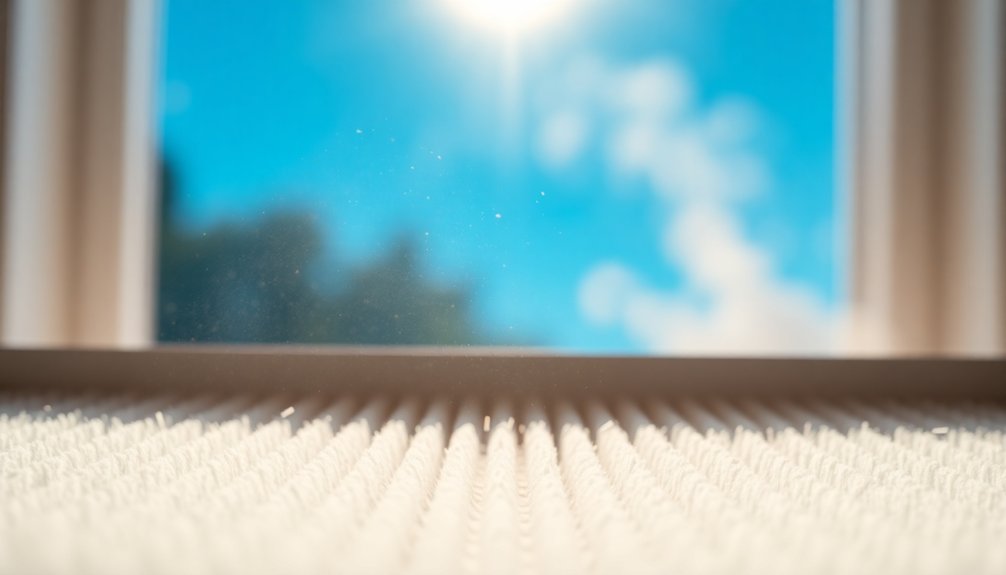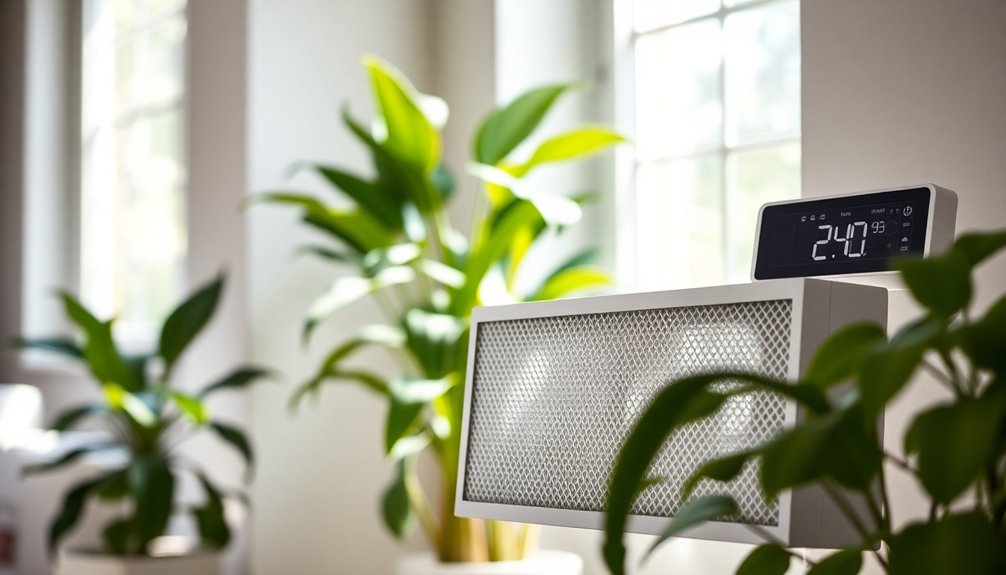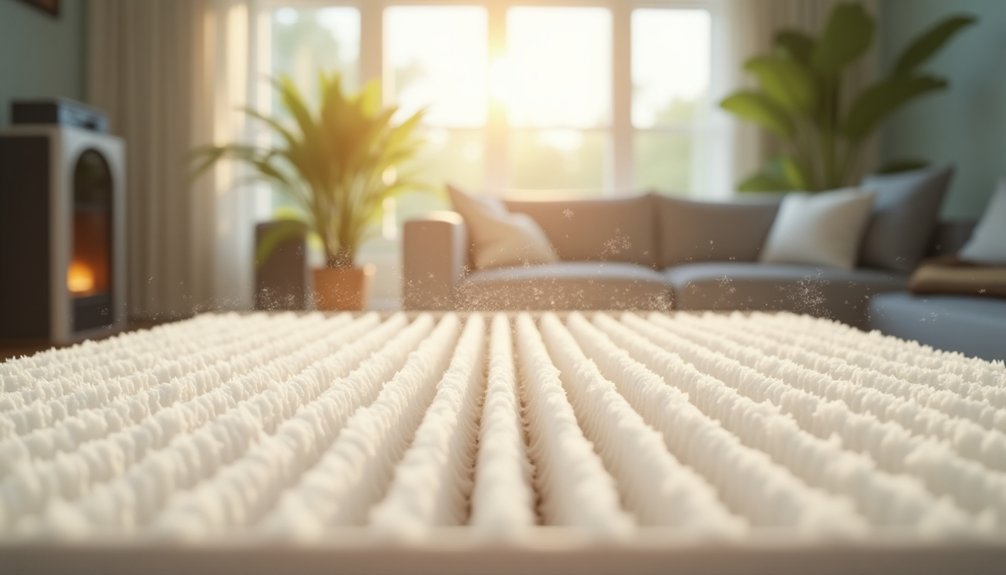Polypropylene air filters are a safe choice for boosting indoor air quality. Their durability and efficiency make them ideal for capturing harmful particles, including ultrafine pollutants. You'll find that they resist abrasion and harmful chemicals, promising long-term use. While they can emit some VOCs and ozone, the benefits often outweigh these concerns, especially with regular maintenance. Plus, they're effective at reducing indoor particulate matter significantly. By understanding the full scope of their applications and limitations, you can make the best choice for your air quality needs. There's plenty more to explore about maximizing your environment's safety and cleanliness.
Key Takeaways
- Polypropylene filters are durable and effective, capturing ultrafine particles down to 0.3 μm, contributing to improved air quality.
- They are resistant to abrasion, acids, and UV exposure, ensuring long-lasting performance in various environments.
- Short-term exposure to fiberglass from HEPA filters may cause mild irritation, but overall health risks are minimal according to WHO guidelines.
- Regular maintenance and proper placement of air cleaners enhance their efficiency and minimize potential emissions.
- Polypropylene filters are safe for use in industrial applications, particularly in food and beverage processing, due to their chemical resistance.
Material Composition and Safety
Polypropylene air filters are designed with a unique combination of durability and filtration efficiency, making them a reliable choice for various applications. The inherent electrostatic charge in these filters enhances their ability to capture particles, thanks to air flow friction.
You'll appreciate that polypropylene is resistant to abrasion, acids, bleaches, and even UV exposure, ensuring long-lasting performance in both indoor and outdoor settings. These filters are also commonly found in HVACR systems, where they play a crucial role in maintaining air quality. Additionally, with polypropylene being a thermoplastic polymer with a high melting point, it can withstand various temperature conditions.
These filters can capture ultrafine particles down to 0.3 μm, making them effective against harmful pollutants. They're classified into categories based on their filtration efficiency, ensuring you get the right level of performance for your needs.
Additionally, polypropylene's nonporous and mildew-resistant properties help maintain its integrity over time, while FDA-approved natural white polypropylene is safe for food processing applications.
Maintenance is straightforward, too; these filters are washable and reusable, offering a cost-effective solution for ongoing air quality management.
With these features, you can confidently use polypropylene air filters in various environments, knowing they combine safety and efficiency for optimal air quality.
Health Effects of Filters
Air filters, including HEPA and polypropylene types, can often raise concerns about potential health effects.
While short-term exposure to fiberglass particles from HEPA filters may cause respiratory irritation, skin itching, or eye redness, the risk of immediate harm is low. The number of fibers released is minimal and well below occupational safety limits, so you're unlikely to face serious health issues. Additionally, HEPA filters remove 99.97% of particles ≥ 0.3 microns, further contributing to cleaner air quality.
Long-term effects appear even less concerning. Although some studies suggest a possible link between fiberglass inhalation and respiratory cancer, the World Health Organization and other research indicate there's no significant long-term harm from the small amounts of fibers shed by HEPA filters.
In fact, as these filters age, their shedding rate decreases, further reducing potential risks. Exposure to microplastic particles from other household items, like plastic kettles, is a more pressing concern for air quality and overall health.
Compared to other airborne dust, the fibers from HEPA filters pose no greater threat. Scientific consensus supports that HEPA filters are safe for everyday use, with little risk to your health.
Emissions From Air Cleaners

While using high-quality air filters can significantly improve indoor air quality, it's essential to consider the impact of plastic production on overall environmental sustainability, as some alternatives to plastic bags, like reusable cotton bags, need to be reused over 130 times to be environmentally preferable. While using high-quality air filters can significantly improve indoor air quality, it's important to be aware of potential emissions from air cleaners. Some devices can emit volatile organic compounds (VOCs), including aldehydes and benzene, which may exceed safety levels.
Ozone production is another concern; certain air cleaners can release ozone, potentially reaching harmful concentrations.
You should also consider ultrafine particles (UFPs), which can be generated during the operation of air cleaners, particularly those with ionizers. These UFPs can accumulate in indoor air, affecting overall air quality. Poor indoor air quality can lead to serious health risks, making it essential to monitor emissions closely.
The sources of these emissions often include the off-gassing of electronic components and plastics, as well as fast heating processes within the devices, similar to the lightweight design of plastic bags contributing to littering issues, particularly affecting marine environments.
To minimize risks, it's crucial to regularly replace filtration components and choose air cleaners with HEPA and activated carbon filters. These can help reduce byproduct emissions and enhance VOC removal efficiency.
Ultimately, while air cleaners can be beneficial, understanding their emissions is vital for maintaining a safe indoor environment. Always check for compliance with regulations like California's UL2998 to ensure you're using a safe product.
Impact on Indoor Air Quality
Using air cleaners can have a significant impact on indoor air quality, making your living spaces healthier and more comfortable. When choosing an air cleaner, consider the material used in the filters, such as polypropylene filters, which are often used in air cleaners due to their durability and resistance to moisture. Portable air cleaners are particularly effective, as they can reduce PM2.5 concentrations by 22.6% to 92.0% in homes and 49% in schools. If you opt for HEPA filters, you'll benefit from their ability to capture 99.97% of 0.3 μm particles, significantly lowering aerosol transmission risks like SARS-CoV-2.
The Clean Air Delivery Rate (CADR) is crucial when choosing an air cleaner; a higher CADR means better particle removal. You might find that using multiple air cleaners, similar to how multiple plastic furniture pieces made from recycled materials like HDPE contribute to a more eco-friendly home, can achieve up to 90% reduction in particles, further enhancing your air quality. Additionally, increased outdoor air dilutes indoor pollutant concentrations, contributing to overall air quality improvement.
However, keep in mind that the effectiveness of these devices can vary based on factors like user compliance and proper placement.
Regular maintenance, including timely filter replacements, is essential to keep your air cleaner functioning optimally.
While considering air cleaners, be aware of potential issues, such as ozone generation and the formation of harmful compounds.
Real-Life Applications and Limitations

Investing in air filtration technology can yield significant benefits across various settings, but it's important to understand both its applications and limitations.
In industrial environments, polypropylene air filters excel in food and beverage processing, providing effective pre-filtration and sterilization. Their robust chemical resistance makes them ideal for handling a variety of substances, including acids and solvents. Additionally, their excellent strength makes them suitable for heavy-duty uses in demanding conditions. Polypropylene air filters also help maintain a stable greenhouse temperature, crucial in some industrial settings.
In environmental contexts, these filters play a crucial role in cleaning oil spills and improving household water quality. When used in air conditioning systems, they enhance indoor air quality and help combat infectious diseases.
However, not all polypropylene filters are created equal. While some are reusable and washable, maintaining them can be a chore. Certain types, like HEPA filters, mightn't be suitable for individuals with respiratory issues, as they don't filter gases or odors effectively.
Additionally, less efficient filters can clog, leading to reduced airflow and increased energy use. Regular temperature monitoring and adequate thermal mass are crucial in such situations, especially when dealing with extreme temperatures.
Ultimately, understanding these nuances helps you make informed decisions about which air filtration solutions best suit your needs. Balancing benefits with limitations is key to optimizing air quality in your environment.
Frequently Asked Questions
Can Polypropylene Air Filters Be Recycled After Use?
Yes, you can recycle polypropylene air filters after use! Check with local facilities for guidelines, remove non-recyclable parts, or consider mail-in options. Recycling helps reduce waste and conserves resources, benefiting the environment.
How Often Should I Replace My Polypropylene Air Filter?
You should replace your polypropylene air filter every 6 months to 2 years, depending on usage and environmental conditions. For pets or allergies, consider replacing it every 20 days to maintain optimal air quality.
Are There Any Certifications for Polypropylene Air Filters?
Yes, polypropylene air filters have several certifications, including EN779:2012 and EN1822:2009 for compliance, ISO 13485:2006 for medical standards, and ISO 9001:2015 for quality management, ensuring their effectiveness and safety in various applications.
Do Polypropylene Air Filters Have a Lifespan?
Yes, polypropylene air filters do have a lifespan. Their longevity depends on usage, environmental conditions, and maintenance. Regularly checking and replacing them ensures optimal performance and prevents issues like clogging and reduced efficiency.
Can I Wash and Reuse Polypropylene Air Filters?
Yes, you can wash and reuse polypropylene air filters, but check for a washability label first. Clean them every 1-3 months using warm water and gentle soap, ensuring they're completely dry before reinstalling.

